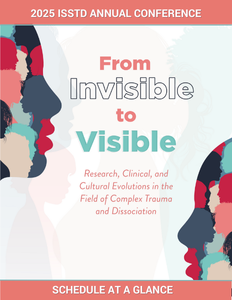Back
Posters
Poster Judging Hour
Impact of Institutional Betrayal and DARVO on Survivors of Clergy-perpetrated Sexual Abuse
Friday, March 14, 2025
6:00 PM – 7:00 PM US Eastern Time
Learning Level: Beginning

Elisabeth A. Ingram (she/her/hers)
Graduate Student
Oklahoma State University
Edmond, Oklahoma, United States
Abstract
This study aims to explore the relationship between institutional betrayal, DARVO (Deny, Attack, Reverse Victim and Offender), and the psychological outcomes for survivors of clergy-perpetrated sexual abuse (CPSA). The research specifically investigates how experiences of being blamed for the abuse and losing community support correlate with the development of post-traumatic stress symptoms, dissociation, and loss of psychological safety among CPSA survivors.
Purpose
The primary objective is to quantify the effects of institutional betrayal and DARVO on the mental health outcomes of CPSA survivors. This research seeks to fill a gap in the literature by providing a quantitative analysis of these dimensions in the population of CPSA survivors, which has not been previously conducted to this extent.
Population
The study will include individuals of any gender who have experienced sexual abuse by an adult occupying a role as a vocational or lay leader in a Christian organization, either as a child or as an adult. Participants will be recruited from the United States through existing support groups, social media, and snowball sampling.
Main Points
1. The study hypothesizes that higher scores on the DARVO and Institutional Betrayal Questionnaire (IBQ-2) scales will correlate positively with scores on the PTSD Checklist (PCL-5) and Dissociative Experiences Scale (DES-II), and negatively with the Neuroception of Psychological Safety Scale (NPSS).
2. The research employs a correlational design using established instruments: DARVO-LF, IBQ-2, PCL-5, DES-II, and NPSS. These measures will assess experiences of institutional betrayal, DARVO, post-traumatic stress symptoms, dissociation, and psychological safety respectively.
3. The study aims to contribute to the understanding of the "double wound" experienced by CPSA survivors: the initial sexual abuse and the subsequent loss of social support. This research will inform mental health counselors, educate communities, and potentially influence public policy regarding religious organizations.
4. The investigation will explore how the unique context of clergy-perpetrated abuse, including the loss of faith community and the betrayal by trusted religious institutions, impacts survivors' mental health outcomes.
5. Results from this study may provide insights into best practices for supporting CPSA survivors, including addressing institutional responses and community support systems.
The researchers anticipate that this study will be completed by January 2025. While specific conclusions are yet unknown, the literature review suggests that higher levels of institutional betrayal and DARVO experiences may be associated with more severe post-traumatic stress symptoms, increased dissociation, and decreased psychological safety among CPSA survivors.
This research has the potential to significantly impact how mental health professionals approach treatment for CPSA survivors, how religious institutions respond to abuse allegations, and how policymakers consider regulations for religious organizations. The findings may also contribute to the broader understanding of institutional betrayal and its effects on trauma survivors across various contexts.
This study aims to explore the relationship between institutional betrayal, DARVO (Deny, Attack, Reverse Victim and Offender), and the psychological outcomes for survivors of clergy-perpetrated sexual abuse (CPSA). The research specifically investigates how experiences of being blamed for the abuse and losing community support correlate with the development of post-traumatic stress symptoms, dissociation, and loss of psychological safety among CPSA survivors.
Purpose
The primary objective is to quantify the effects of institutional betrayal and DARVO on the mental health outcomes of CPSA survivors. This research seeks to fill a gap in the literature by providing a quantitative analysis of these dimensions in the population of CPSA survivors, which has not been previously conducted to this extent.
Population
The study will include individuals of any gender who have experienced sexual abuse by an adult occupying a role as a vocational or lay leader in a Christian organization, either as a child or as an adult. Participants will be recruited from the United States through existing support groups, social media, and snowball sampling.
Main Points
1. The study hypothesizes that higher scores on the DARVO and Institutional Betrayal Questionnaire (IBQ-2) scales will correlate positively with scores on the PTSD Checklist (PCL-5) and Dissociative Experiences Scale (DES-II), and negatively with the Neuroception of Psychological Safety Scale (NPSS).
2. The research employs a correlational design using established instruments: DARVO-LF, IBQ-2, PCL-5, DES-II, and NPSS. These measures will assess experiences of institutional betrayal, DARVO, post-traumatic stress symptoms, dissociation, and psychological safety respectively.
3. The study aims to contribute to the understanding of the "double wound" experienced by CPSA survivors: the initial sexual abuse and the subsequent loss of social support. This research will inform mental health counselors, educate communities, and potentially influence public policy regarding religious organizations.
4. The investigation will explore how the unique context of clergy-perpetrated abuse, including the loss of faith community and the betrayal by trusted religious institutions, impacts survivors' mental health outcomes.
5. Results from this study may provide insights into best practices for supporting CPSA survivors, including addressing institutional responses and community support systems.
The researchers anticipate that this study will be completed by January 2025. While specific conclusions are yet unknown, the literature review suggests that higher levels of institutional betrayal and DARVO experiences may be associated with more severe post-traumatic stress symptoms, increased dissociation, and decreased psychological safety among CPSA survivors.
This research has the potential to significantly impact how mental health professionals approach treatment for CPSA survivors, how religious institutions respond to abuse allegations, and how policymakers consider regulations for religious organizations. The findings may also contribute to the broader understanding of institutional betrayal and its effects on trauma survivors across various contexts.
Learning Objectives:
At the conclusion of this session participants will be able to:
- Describe the relationship between institutional betrayal, DARVO, and mental health outcomes in survivors of clergy-perpetrated sexual abuse
- Explain the concept of the "double wound" experienced by survivors of clergy-perpetrated sexual abuse
- Identify at least three potential mental health impacts of institutional betrayal and DARVO on survivors of clergy-perpetrated sexual abuse
- Analyze the role of community support in mitigating post-traumatic stress symptoms among survivors of clergy-perpetrated sexual abuse
- Apply knowledge of institutional betrayal and DARVO to improve trauma-informed care practices for survivors of clergy-perpetrated sexual abuse

